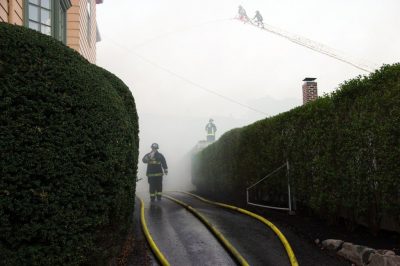The Massachusetts Department of Conservation and Recreation didn’t just fight fires during this year’s droughts. It also fought a pandemic.

Dave Celino, chief fire warden for the DCR, said he chose to call his annual fire report “The 2020 Fire Season: Not So Normal” because of the unique challenges posed by both.
“We even got to some conditions this summer where things were so dry that even a cigarette butt thrown out the window on the roadside could ignite cured-off and dry grasses,” Celino said.
Drought conditions cause fires to burn deeper in the ground, Celino said, making them harder to suppress.
Around 98 percent of fires in the state are caused by humans, Celino said, adding that fireworks played a role in several ignitions this year.
He said droughts have also become more frequent in recent years.
Despite stay-at-home orders encouraging people to remain indoors, Celino said his department still had a responsibility to combat fires.
“For the fire service, emergency services, it wasn’t as simple as us just staying home,” Celino said. “We still have a mission to provide. We still had fires going on.”
The Department needed to strike a balance between public safety and their employees’ own health, he said.
“How are we going to still respond to the public’s needs and emergency services, wildland fire included, and keep our personnel safe?” Celino said. “How do we apply the simple tactic of wearing masks and [personal protective equipment] when we’re in the backcountry fighting fire?”
He said people should be aware of when the state is experiencing a drought or other circumstances that make fire ignitions more likely.
“Pay attention to the conditions that are at hand,” Celino said. “Be extra careful when you’re using incendiary devices or burning outside.”
Auroop Ganguly, civil and environmental engineering professor at Northeastern University, wrote in an email that climate change has made wildfires more likely.
“This is a matter of probability, of ‘loading the dice,’” Ganguly wrote. “Certainly heatwaves and certain aspects of meteorological droughts … are getting statistically intensified owing to climate change, including in Massachusetts.”
He wrote that addressing climate change by reducing fossil fuel use will not immediately stop all extreme weather events like droughts. So, in the meantime, society must adapt to these events.
“What are needed in addition are the abilities of societies and infrastructures to become more resilient through proper planning and investments,” Ganguly wrote, “and for policy makers and engineers to invest in adapting to change.”
Celino said the fall could bring more fires if the drought continues.
“The soil conditions are already super dry for us because we’re in moderate to severe drought, and the leaf litter is going to start to build up because the forest will start to drop leaves,” Celino said. “That is that alignment that comes together to worry fire managers like me.”
























































































































